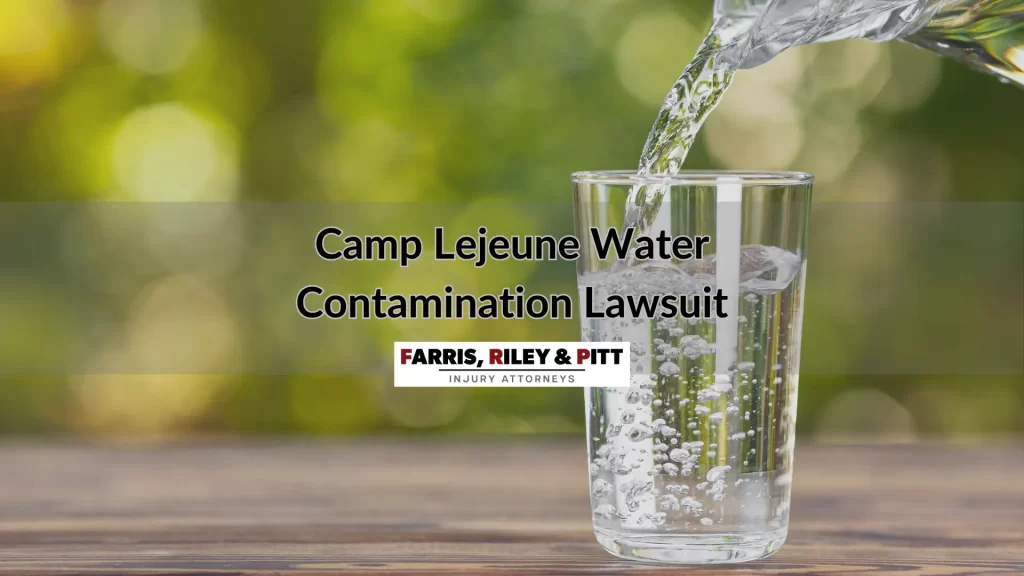We are no longer accepting new Camp Lejeune cases.

In 1985, it was discovered that the water supply at Marine Corps Base Camp Lejeune near Jacksonville, NC, was contaminated with toxic volatile organic compounds (VOCs) including PCE (perchloroethylene), TCE (trichloroethylene), vinyl chloride, and benzene. Studies link these chemical compounds to serious illnesses and health conditions such as various types of cancer, Parkinson’s disease, and reproductive issues.
If you served at Camp Lejeune between August 1, 1953, and December 31, 1987, and later received a diagnosis of cancer or another severe health condition, you might qualify to pursue a claim against the federal government.
Contact a Camp Lejeune water contamination lawyer at Farris, Riley & Pitt, LLP today for a free consultation to discuss your case and legal options. You can reach us by phone at (205) 324-1212.
Water Contamination at Camp Lejeune
Two water treatment facilities at Camp Lejeune, the Tarawa Terrace and the Hadnot Point plants, primarily experienced water contamination.
Investigators found wells at the Tarawa Terrace water treatment facility contaminated with the chemical PCE. PCE is colorless and odorless and is frequently used as a dry cleaning agent. In fact, investigators traced the source of the water contamination at the Tarawa Terrace facility to a nearby dry cleaning company, ABC One-Hour Cleaners. The company negligently disposed of its toxic waste, allowing chemicals like PCE to seep into the groundwater. Most of the highly contaminated wells at the Tarawa Terrace facility were retired in February 1985, when rigorous testing revealed significantly elevated levels of the compound.
Researchers thoroughly tested the water at the Hadnot Point water treatment facility in early 1985. It was found to be contaminated with dangerously high levels of TCE, along with other chemical compounds like PCE, DCE (dichloroethylene), vinyl chloride, and benzene. Various sources, from leaking subterranean fuel tanks to hazardous waste disposal and spills, caused the VOCs contamination at the Hadnot Point water treatment plant. In early 1985, authorities shut down the most contaminated wells at Hadnot Point, similar to the Tarawa Terrace facility’s timeline.
People living or working near the Holcomb Boulevard facility might have encountered contaminated water from 1972 to 1985. When demand was high, the Holcomb Boulevard treatment plant would sometimes receive supplemental water from the Hadnot Point facility.
Tragically, over 30 years lapsed from the start of the contamination to the retirement of the affected wells. During that time, the government failed to test the water thoroughly, exposing many to severe illness risks.
Health Issues Caused by Camp Lejeune Water Contamination
 Studies tie the four main VOCs in Camp Lejeune’s water supply to numerous severe health conditions and diseases, including:
Studies tie the four main VOCs in Camp Lejeune’s water supply to numerous severe health conditions and diseases, including:
- Breast cancer
- Liver cancer
- Kidney cancer
- Bladder cancer
- Prostate cancer
- Cervical cancer
- Ovarian cancer
- Lung cancer
- Esophageal cancer
- Leukemia
- Non-Hodgkin’s lymphoma
- Multiple myeloma
- Parkinson’s disease
- Neurobehavioral issues
- Hepatic steatosis
- Miscarriages
- Decreased fertility
- Birth defects
- Renal toxicity
- Liver disease
- Scleroderma
If you received a diagnosis for any of the listed conditions and suspect a connection to Camp Lejeune’s water contamination, you might soon claim a legal right to hold parties, including the federal government, accountable for misconduct.
The Camp Lejeune Justice Act
Until recently, the law prevented victims of Camp Lejeune’s water contamination from suing the government. This is because of North Carolina’s ten-year statute of repose on pollution-related injury lawsuits, which has long since passed for Camp Lejeune victims.
In a civil case, the statute of limitations sets a standard filing period, typically starting when the injury happens. The statute of repose starts its filing window when the negligent party first commits misconduct. When these filing periods end, victims can no longer sue.
The North Carolina statute of repose ended roughly 20 years before researchers thoroughly tested Camp Lejeune’s water. For decades, those diagnosed due to on-base water contamination had no legal means to hold negligent parties accountable.
However, the Camp Lejeune Justice Act, signed into law by President Biden in 2022, altered that situation. Under the new law, anyone diagnosed with one of the above conditions after living at Camp Lejeune could have grounds for a lawsuit. This means victims can seek financial relief for economic and non-economic losses resulting from toxic exposure at the military base.
Under the 2012 Janey Ensminger Act, the law permits veterans and family members diagnosed with specific health conditions after living at Camp Lejeune to seek health care benefits. These benefits are available through the Department of Veterans Affairs (VA) and provide an essential lifeline to many. But now, veterans, family members, and civilian staff stationed at Camp Lejeune can pursue compensation through the courts as well.
Contact a Birmingham Camp Lejeune Water Contamination Lawyer Today
Did a diagnosis of cancer or another serious condition come your way after you lived or worked at Camp Lejeune between August 1, 1953, and December 31, 1987? Under the Camp Lejeune Justice Act of 2022, you could be entitled to seek compensation for medical expenses, lost income, pain and suffering, and other losses you suffered.
At Farris, Riley & Pitt, LLP, our Camp Lejeune water contamination lawyers are prepared to begin taking related lawsuits as soon as the bill is signed into law. We have the experience and resources to help you gather evidence for your case, navigate the legal process, and pursue the financial relief that you deserve. Contact our legal team of experienced attorneys today at (205) 324-1212 or contact us online to schedule a consultation with our office.
Related Reading:















